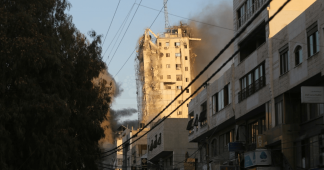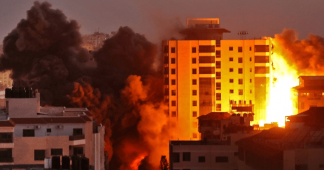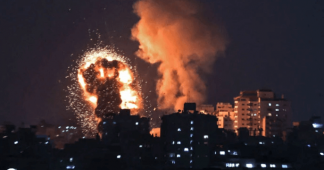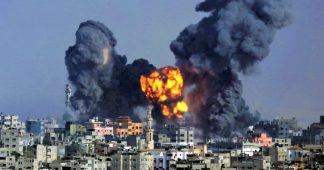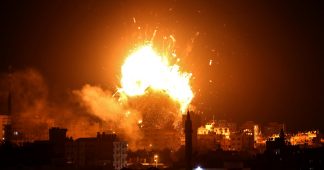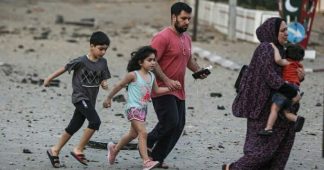May 14, 2021
ISRAELI TROOPS HAVE entered the Gaza Strip as part of the ongoing military operation against the Palestinian Islamist movement Hamas, the military said tonight.
“Israeli planes and troops on the ground are carrying out an attack in the Gaza Strip,” the army said in a brief message.
Army spokesman Jonathan Conricus confirmed that Israeli soldiers had entered the Palestinian enclave.
As violence escalated throughout the day, Israel security forces also scrambled to contain deadly riots between Jews and Arabs, with projectiles also fired on Israel from Lebanon.
US Secretary of State Antony Blinken said Washington was “deeply concerned about the violence in the streets of Israel”, voicing support for a United Nations Security Council meeting “early next week” on the crisis.
“We believe that Israelis and Palestinians deserve equal measures of freedom, security, dignity and prosperity,” Blinken said.
There were intense artillery exchanges tonight, and AFP reporters saw Israeli troops assembling at the security barrier.
Balls of flames rose high into the sky after strikes smashed into densely packed Gaza.
Dozens of rockets were fired from Gaza towards the southern Israeli coastal cities of Ashdod and Ashkelon, and in the vicinity of Tel Aviv’s Ben Gurion airport.
“We are prepared, and continue to prepare for various scenarios,” Conricus said, earlier describing a ground offensive as “one scenario”.
In Gaza, AFP photographers said people were evacuating their homes in the northeastern part of the enclave ahead of possible Israeli attacks, with Hamas, the Islamist group that controls Gaza, warning of a “heavy response” to a possible ground incursion.
‘Massive reinforcement’
With the conflict showing no signs of easing, Israel has been rocked by an unprecedented wave of mob violence, in which both Arabs and Jews have been savagely beaten and police stations attacked.
Defence Minister Benny Gantz ordered a “massive reinforcement” to suppress the internal unrest.
Despite global alarm and diplomatic efforts to de-escalate Gaza hostilities, which US President Joe Biden said he hoped would end “sooner than later”, hundreds of rockets again tore through the skies.
The heavy bombardments coincided with the start of Eid al-Fitr, which marks the end of the Muslim holy fasting month of Ramadan, and saw the faithful pray at mosques and amid the rubble of Gaza’s collapsed buildings.
Israel’s air force launched multiple air strikes, targeting locations linked to Hamas, with the air force saying jets had struck a “military compound” of the group’s “intelligence headquarters”.
At least 103 people have been killed since Monday, including 27 children, and more than 580 wounded, the health ministry in Gaza said.
Heavy bombardments have brought down entire tower blocks.
Inside Israel, seven people have been killed since Monday, including one six-year-old, after a rocket struck a family home.
‘Preventing pogroms’
The Israeli military said it had hit targets in Gaza more than 600 times while 1,750 rockets were fired from the enclave.
Hundreds of rockets were intercepted by the Iron Dome air defence system.
Three rockets were also fired from southern Lebanon towards Israel, landing in the Mediterranean Sea, Israel’s army said.
A source close to Israel’s arch-enemy Hezbollah said the Lebanese Shiite group had no link to the incident.
The military escalation was triggered by weekend unrest at Jerusalem’s Al-Aqsa mosque compound, which is sacred to both Muslims and Jews.
The disturbances, in which riot police had repeatedly clashed with Palestinians, has been driven by anger over the looming evictions of Palestinian families from the Sheikh Jarrah neighbourhood of east Jerusalem.
The surging tensions sparked clashes in many of Israel’s mixed towns where Jews live alongside Arabs, who make up about 20% of the country’s population.
Nearly 1,000 border police were called in to quell the violence, and over 400 people were arrested.
Police spokesman Micky Rosenfeld said inter-communal violence in multiple towns was at a nadir not seen for decades, and that police were “literally preventing pogroms”.
Published at www.thejournal.ie
